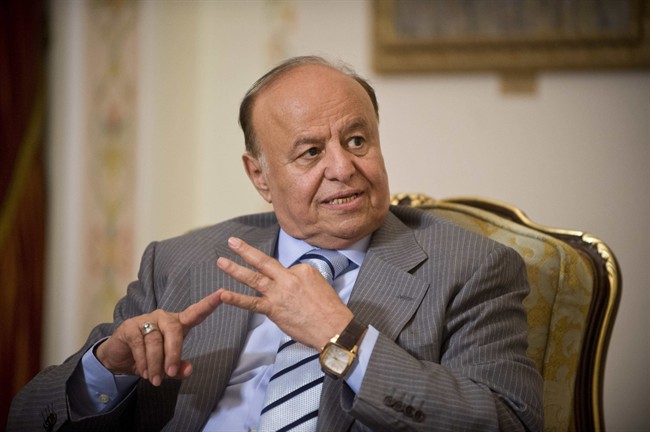SANAA, Yemen – Yemen’s internationally recognized president will not participate in U.N.-brokered talks later this week with Shiite rebels who control the capital and much of the country’s north, his office said Sunday.

The statement said there would be no talks with the rebels, known as Houthis, unless they accept a U.N. resolution that obliges them to withdraw from areas they seized and surrender weapons taken from state institutions.
President Abed Rabbo Mansour Hadi fled Yemen earlier this year, and his government is currently based in Saudi Arabia, which is leading a U.S.-backed coalition that has been striking the Iran-supported rebels from the air since March.
Yemen’s conflict pits an array of forces against the Houthi rebels, who are allied with security forces loyal to former President Ali Abdullah Saleh. The conflict has killed more than 4,000 people, leaving the Arab world’s poorest country in the grip of a humanitarian crisis and on the brink of famine.
READ MORE: UN: Yemen conflict has killed nearly 400 children, similar number recruited to fight
Several previous attempts to get the parties to end the conflict have failed, and it has proven nearly impossible to arrange a humanitarian pause to deliver desperately needed aid.
A day earlier, a suspected U.S. drone attack on a military encampment killed at least four people east of Mukalla, the al-Qaida-controlled capital of Yemen’s sprawling province of Hadramawt, independent security officials there said Sunday. The victims, the officials and witnesses said, were buried nearby while scores of masked gunmen on motorcycles cordoned off the site of the attack.
The officials and witnesses spoke on condition of anonymity because they are not authorized to brief journalists or fear reprisals.
Meanwhile, mourners in the United Arab Emirates grieved over the loss of servicemen killed in a Sept. 5 missile attack in Yemen after additional bodies arrived in the federal capital, Abu Dhabi, on Saturday following their identification in Saudi Arabia.
The Emirates said a total of 52 of its soldiers – seven more than the 45 it earlier acknowledged – were killed in the Houthi rebel attack. It was the heaviest military loss for the country since it was founded in 1971. The soldiers were deployed as part of the Saudi-led coalition.
Associated Press writer Adam Schreck in Dubai, United Arab Emirates contributed to this report.



Comments